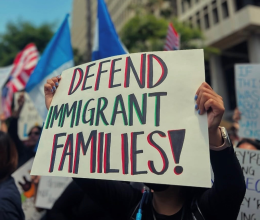As a result of a recent court ruling in Rodriguez v. Robbins, the government can no longer lock up immigration detainees for six months or longer without a bond hearing. Since this ground-breaking ruling went into effect, hundreds of immigration detainees in Southern California have had their first opportunity to ask a judge for release on bond. But the government refuses to disclose basic details about these hearings, keeping the public in the dark about how many detainees are winning release.
Earlier this week, the ACLU filed a motion to compel the government to disclose this information. Some of the data isn’t secret: A government attorney has already said in open court that two-thirds of the detainees who have had a hearing under the court’s ruling have been released on bond. The ACLU is simply asking for government transparency: the opportunity to learn basic information about how the court’s order has been implemented, including the outcome of bond hearings for prolonged detainees.
Why won’t the government turn over this information? As the government acknowledges in opposing the ACLU’s motion, the information is harmful to the government’s position. If the government’s own immigration judges are ordering the release on bond of two-thirds of detainees who now have the right to a hearing, then the government’s argument that these detainees are too dangerous to be on the streets falls apart. In hearing after hearing, these judges are finding that immigrant detainees can be released without risking the security of the public.
The government fought the ACLU’s efforts to secure basic due process rights for detainees who spent months – or even years – behind bars. In September 2012, in a class-action lawsuit brought by the ACLU, the U.S. District Court for the Central District of California granted a preliminary judgment, ordering the government to provide bond hearings for immigrant detainees behind bars for six months or longer. The U.S. Court of Appeals for the Ninth Circuit upheld the order in April 2013.
The court’s decision will affect thousands of immigrant detainees. In 2011 alone, the United States imprisoned 429,000 immigrants in deportation proceedings, an estimated 25 percent of whom were detained within the Ninth Circuit. As the government continues its fight to overturn the court’s order and return to its practice of detaining individuals without meaningful review, it has an obligation to disclose basic information about the bond hearings it claims are unnecessary and impracticable.
Michael Kaufman is Staff Attorney at the ACLU of Southern California
Report ICE Activity
Contact your local rapid response network.

